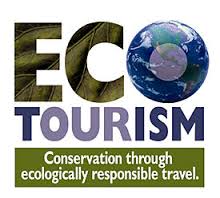INTRODUCTION
Eco Tourism can change the unequal relationships of conventional tourism. So it encourages the use of indigenous guides and local products. It provides local people with financial incentives to safeguard their environment. There are some principles of eco tourism.
PRINCIPLES OF ECO-TOURISM
Expanding on the TES definition, the Eco-Tourism Society (TES) has developed seven basic Principles of Eco-Tourism. Such as:
Minimize impact
Avoids negative impacts that can damage or destroy the integrity or character of the natural or cultural environments being visited.
Build environmental and cultural awareness and respect
Emphasis to create awareness and aims to educate the traveler about the importance of conservation.
Provide direct benefits for conservation:
Direct revenues to the conservation of natural area and the management of protected areas.
Planning and sustainable growth
Emphasizes the need for planning and sustainable growth of the tourism industry and seeks to ensure that tourism development does not exceed the social and environmental “Capacity”.
Revenues earning
Retains a high percentage of revenues in the host country by stressing the use of
locally owned facilities and services.
Economic benefits:
Brings economic benefits to local communities and directs revenues to local people living adjacent to protected areas.
Develop sensitivity:
Increasingly relies on infrastructure that has been developed sensitively in harmony with the environment- minimizing use of fossil fuels, conserving local plant and wild life and blending with natural environment. In fact these principles aim at preservation, awareness, sustainability in the backdrop of growth and development aim of eco-tourism.
KEY ELEMENTS OF ECO-TOURISM
The major elements of eco-tourism are as follows:
Biodiversity Conservation
Eco-tourism can contribute to biodiversity conservation in many ways.
Firstly by providing environmental education and ecological awareness to the different sectors involved; domestic and forging tourists, local community, local authorities and the tourism industry itself.
Economic value
Eco-tourism also provides economic value to biodiversity resources, so that all stakeholders involved will be vitally interested in conserving biodiversity.
Community or people participation
Eco-tourism struggles to meet the needs of local people in terms of socio-economic benefits. This leads to people participation in protecting natural resources and becomes an important source of income for her local community.
Environmental education and training
Environmental education and training are vital for enhancing the links between biodiversity conservation planning and tourism. Proper environmental education and awareness – building awareness among local communities/people, the private sector, tourists and government so as to promote responsible actions to avoid adverse impacts and increase help for conservation policies and program.
Monitoring and evaluation
To protect the potential negative impacts and damage through monitoring and evaluation. Frequently, negative social and ecological impacts caused by tourists result from the fact that guests have little or no understanding of the local culture and ecology.
Awareness of environmental issues
It is very important to increase public awareness of environmental issues through tools such as TV and radio program, magazines and posters. Education of consumer campaigns is needed to support this system.
Tourism Industry
Tourism Industry is one of the major components of eco-tourism. It is essential to promote the eco-tourism or nature tourism.
ESSENTIALS OF ECO-TOURISM
Eco-tourism involves traveling with undisturbed natural area which, specific object of studying, admiring and enjoying the scenery and its wild plants and animal as well as any existing cultural aspects in the tour spots. Eco-tourism is responsible travel to natural areas that conserves the environment and sustains the well being of local people. Thus, eco-tourism has unique pattern of tourism sector. The essentials of eco-tourism are as follows:
- It must promote positive environmental ethics fostering preferred behavior in its participants.
- It does not degrade the resources; there is no consumptive erosion of the natural environment.
- It concentrates in intrinsic rather than extrinsic values. Facilities and services may; Facilitate the encounter with intrinsic resource; they never become attraction in their own right nor do they distract from the natural attraction itself.
- It must benefit the wildlife and environment. If the environment has not at least achieved a net benefit towards its sustainability and ecological integrity, then the activities is not eco-tourism.
- It is bio-centric rather than homocentric in philosophy. Eco-tourists enter the environment accepting it on its term, not expecting it to change or be modified for their convenience.
CONCLUSION
Above principles contribute integrity of social, economic and environmental goals.
Eco-Tourism means making as little environmental impact as possible and helping to sustain the indigenous populace, thereby encouraging the preservation of wild life and habitats when visiting a place. This is responsible form of tourism and tourism development, which encourages going back to natural products in every aspect of life. It is also the key to sustainable ecological development. In fact some national and international researcher and research organizations make examined Eco-Tourism from their point of views.
















